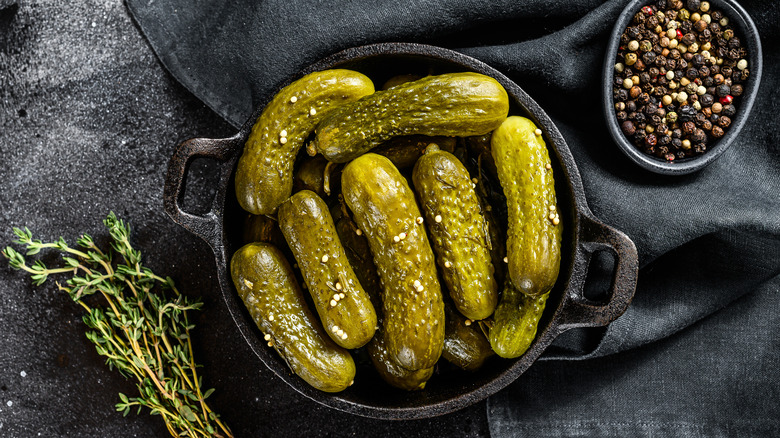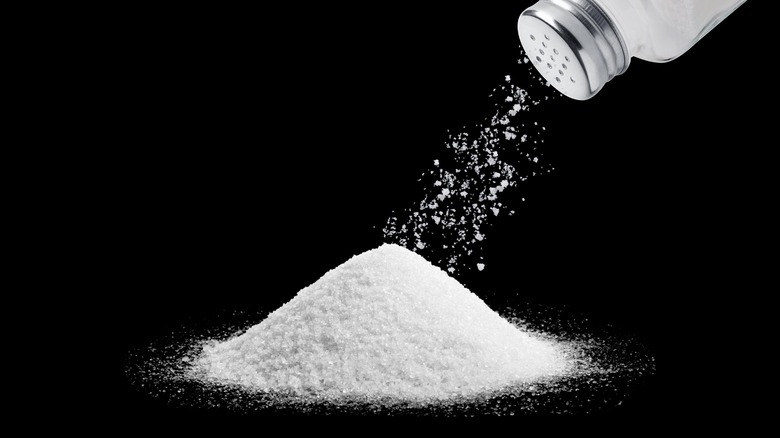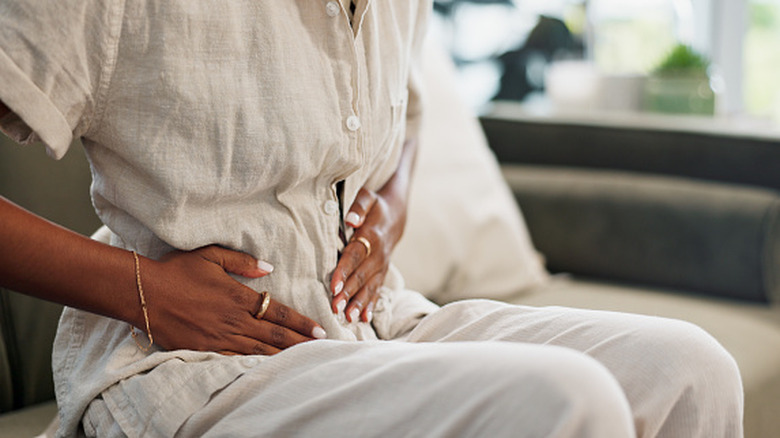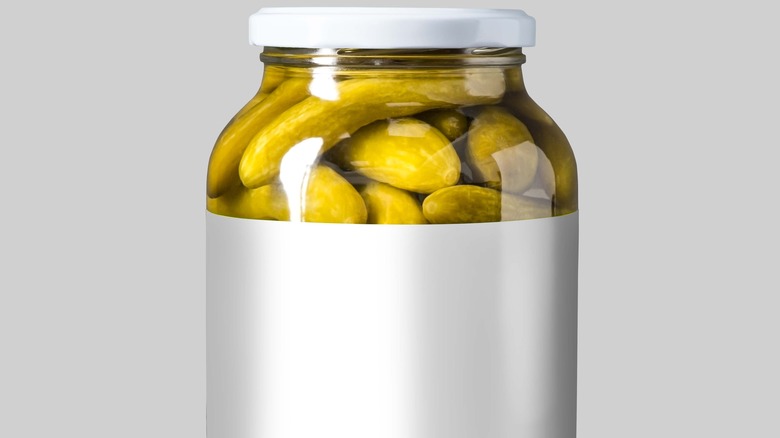What Happens To Your Body When You Eat Too Many Pickles
Chances are, you know someone who is obsessed with all things pickles! The tangy treats can be added to sandwiches, burgers, and even some salad recipes to help bring some zest to any dish. According to LiveStrong, pickles are a prime snack option for dieters as they are low in calories.
The term pickle simply describes the process of preservation through an acidic liquid. Essentially any fruit or vegetable submerged into an acidic liquid for preservation, such as kimchi, is considered a 'pickle' (per PBS). However, the most common association of the term 'pickle' refers to the tangy, briny cucumbers that have a familiar bite and crunch.
Pickles can be made using a fermentation process that can create a sour taste as the process breaks down the chemical composition of the cucumber. An alternative method that's commonly used by home cooks is to use a solution of vinegar and salt, notes PBS.
These delicious and delightfully bright veggies are a great snacking source, but what happens when you have too many?
Increased Sodium Levels
Pickles are known for their sour and salty taste, but the sodium content in an average serving may be surprising. According to Health, a single dill pickle spear contains over 300 milligrams of sodium! The recommended limit for sodium intake for a healthy adult is 2,300 milligrams per day, according to the Centers for Disease Control and Prevention (CDC). So while those salty spears may be just what hits the spot, you'll want to keep an eye on their Nutrition Facts label, and be careful not to exceed the recommended daily intake of sodium.
It's no secret that having a diet with too much salt or sodium is harmful. In fact, your doctor may recommend reducing your daily salt intake even if you're otherwise healthy. Too much salt in your daily diet can increase your risk for health issues like heart attack, stroke, diabetes, and kidney disease, according to WebMD. A high sodium level, when maintained daily, can also weaken bones and contribute to high blood pressure.
Gassiness and bloating
As it turns out, pickles can also lead to some minor gastrointestinal distress. You might be surprised to hear that pickles can cause gassiness and bloating, but according to LiveStrong, cucumbers are indeed on the list of foods that can cause gassiness in some individuals. When consumed in large amounts, pickles can cause you to become bloated and gassy.
This is due to a reaction in individuals to the chemical cucurbitacin. Cucurbitacin is an alkaloid produced by certain plants in an attempt to protect themselves from disease, according to the Canadian Academy of Sports Nutrition. For some individuals, this alkaloid causes intestinal distress which results in the production of gas that can cause diarrhea, burping, or bloating. While eating one or two pickle spears at lunch may not make you burp the alphabet in your afternoon meeting, having an excessive amount of pickles each day can cause you to be a bit more gassy than you'd prefer.
Heartburn
Heartburn can make it feel like your stomach and esophagus is on fire. It's often the byproduct of too much acid or a disagreeable food being consumed. Your grandmother or great aunt may have recommended pickle juice as a home remedy for heartburn, but today's commercially produced pickles aren't exactly the right ones for the job.
While pickles which are rich in healthy gut bacteria may help to alleviate heartburn, most commercially produced pickles have been pasteurized, which strips away any healthy (or unhealthy) bacteria, according to Healthline. In fact, pickles made in vinegar may only exacerbate your symptoms, warns LiveStrong. Heartburn is often a response to acidic foods, which includes foods that have been made with vinegar.
On the other hand, fermented pickles will not necessarily have this effect. Moreover, if you're the type who prefers growing and pickling your own cucumbers, you may find that there are seedless and "burpless" cucumber strains which are said to have reduced risk of causing gastrointestinal distress, according to LiveStrong.
Increased Thirst
It is no secret that salty foods can make you more thirsty than you have ever been. We know that this is the case for chips and pizza, and as it turns out, pickles are no exception, according to LiveStrong. This is one area where the differences between fermented pickles and those processed in a brine solution are not significant. A direct result of increased sodium, a diet with too many pickles can leave you feeling desperate to quench your thirst.
LiveStrong explains that the body's natural response to increased sodium levels is to flush the body with fluids in an attempt to rebalance electrolyte levels. So if you find yourself reaching for bottle after bottle of water, you may want to examine how much sodium you have recently ingested. If you are eating a pickle with each meal, you may find yourself feeling more thirsty than usual.
Health benefits to eating pickles in moderation
In moderation, the addition of pickles to your diet can be beneficial. In fact, according to WebMD, a whole dill pickle can have nutrients such as vitamin K, vitamin A, and potassium. As pickles are made primarily from cucumbers, there's also a possible boost of beta-carotene, a powerful antioxidant, that may come from crunching on this treat.
If you opt for fermented pickles, you may also be benefiting from the healthy probiotics often found in fermented foods. These healthy bacteria are known to aid in the digestive process by helping to break down complex carbohydrates, according to the Cleveland Clinic. Pickle juice is often also considered a good remedy for cramps, points out Healthline. What's more, pickle juice is said to aid in recovery from hangovers (per Cleveland Clinic).
So when contemplating your choices for a quick and convenient snack, pickles can be a great addition! However, be sure not to overdo it and stay within the suggested serving size.






